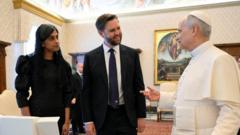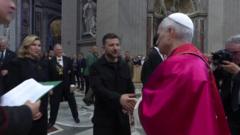Pope Leo XIV, formerly Cardinal Robert Francis Prevost, has captured the attention of the Catholic world following his unexpected election. His unique background and leadership style suggest a shift towards a more inclusive and globally-oriented church.
Pope Leo XIV: A New Era in the Vatican Begins

Pope Leo XIV: A New Era in the Vatican Begins
Pope Leo XIV’s election signals a transformative moment for the Roman Catholic Church, blending American influence with a global perspective.
In an event that shocked many, Cardinal Robert Francis Prevost has emerged as the new head of the Roman Catholic Church under the name Pope Leo XIV. Elected on May 7, 2025, during a conclave held at the Vatican, his selection reflects a remarkable blend of influences—being both an American and a prominent figure in Latin American Catholicism.
Pope Leo XIV, 69, was born and raised in the United States, a country critical to the church’s financial stability, but he has spent many years serving in Peru, where he developed a deep understanding of the needs of the faithful in a vibrant part of the world. His experience as a missionary and bishop, along with leadership roles such as heading the Pontifical Commission for Latin America, positioned him as a unifying figure in the church's efforts to resonate with diverse congregations worldwide.
The new pope enjoys the backing of his predecessor, Pope Francis, who appointed him to key positions, demonstrating trust in his judgment and capabilities. This recognition was crucial in a time when the church seeks to reconcile tradition with the demands of modernity. Observers noted that Leo XIV’s election signifies a shift in the Vatican's power dynamics as he caters to both liberal and conservative factions within the church, reflecting a broader, more adaptable approach to papal leadership.
In the past, an American nationality could have been a liability for papal candidates, often viewed as an impediment due to perceptions of ties to U.S. politics. However, the church’s evolution has diminished the political significance of nationality, making way for representation from diverse backgrounds. Analysts like John Allen pointed out that Leo XIV "checked all the boxes" necessary for today's papacy, as the global church embraces a future that is more inclusive and international in scope.
As Pope Leo XIV ascends to leadership, many Catholics are left hopeful about the new directions the church may take under his guidance, reassured by his previous commitments to making decision-making processes more engaging and reflective of the community's voice. This new pontificate may herald a significant chapter for the Vatican and its global followers.
Pope Leo XIV, 69, was born and raised in the United States, a country critical to the church’s financial stability, but he has spent many years serving in Peru, where he developed a deep understanding of the needs of the faithful in a vibrant part of the world. His experience as a missionary and bishop, along with leadership roles such as heading the Pontifical Commission for Latin America, positioned him as a unifying figure in the church's efforts to resonate with diverse congregations worldwide.
The new pope enjoys the backing of his predecessor, Pope Francis, who appointed him to key positions, demonstrating trust in his judgment and capabilities. This recognition was crucial in a time when the church seeks to reconcile tradition with the demands of modernity. Observers noted that Leo XIV’s election signifies a shift in the Vatican's power dynamics as he caters to both liberal and conservative factions within the church, reflecting a broader, more adaptable approach to papal leadership.
In the past, an American nationality could have been a liability for papal candidates, often viewed as an impediment due to perceptions of ties to U.S. politics. However, the church’s evolution has diminished the political significance of nationality, making way for representation from diverse backgrounds. Analysts like John Allen pointed out that Leo XIV "checked all the boxes" necessary for today's papacy, as the global church embraces a future that is more inclusive and international in scope.
As Pope Leo XIV ascends to leadership, many Catholics are left hopeful about the new directions the church may take under his guidance, reassured by his previous commitments to making decision-making processes more engaging and reflective of the community's voice. This new pontificate may herald a significant chapter for the Vatican and its global followers.




















